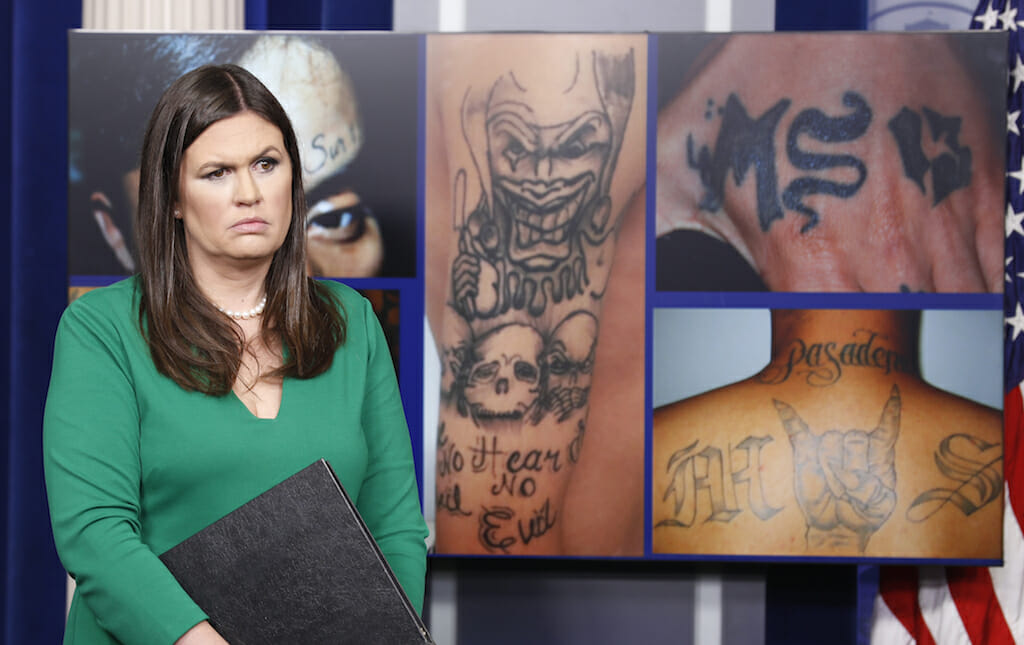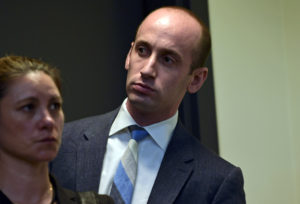Mother Who Lost Son to MS-13 Denounces Trump’s Racist Immigration Policies
The president has lied and exaggerated the threat of the gang, and even used the grief of parents who have lost children to further his cruel anti-immigrant agenda. White House press secretary Sarah Huckabee Sanders stands in front of pictures of MS-13 gang tattoos during a 2017 press briefing at the White House. (Alex Brandon / AP)
White House press secretary Sarah Huckabee Sanders stands in front of pictures of MS-13 gang tattoos during a 2017 press briefing at the White House. (Alex Brandon / AP)
President Trump was in West Virginia last week to laud his party’s tax reform law when he decided to throw out his scripted remarks and pivot instead to his favorite issue: immigration. Later, aboard Air Force One, he continued his tirade, boasting about the harsh enforcement by Border Patrol officers under his administration in kicking out hundreds of immigrants a day. “We don’t know if they’re murderers, if they’re killers, if they’re MS-13,” he said. The gang, whose name is an acronym for Mara Salvatrucha, has been one of Trump’s favorite targets to justify harsh immigration policies.
MS-13 has Central American immigrant roots, but rather than being a problem imported into the U.S. from outside, the gang is a homegrown phenomenon. It was formed decades ago in Los Angeles, and in fact MS-13 members rounded up and deported to El Salvador by the government under President Clinton exported the gang problem to Central America. Now, the group’s signature violent tactics and dramatic face tattoos are a dream come true for immigrant haters like Trump and his resentful base.
But one woman whose 17-year-old son was brutally murdered during a series of incidents linked to MS-13 members has been appalled by Trump’s use of the gang to scapegoat all immigrants. Oscar Daniel Joaquin was living with his father in Santa Maria, Calif., near Santa Barbara, when he was killed on July 28, 2015. His mother, Rebekah Spicuglia, recently shared the story of her son with me in an interview.
“Oscar was very loved, he was very popular,” she said of her only child. Videos of the precocious young man on an online memorial show a child who loved to rap, dance and smile. “He was very special, he was very creative, energetic, very stylish, very cool,” said Spicuglia. Choking back tears, she explained, “It’s just really hard to summarize your son’s life in such a way—it doesn’t even begin to encapsulate him.”
As a mother of two young boys, my worst nightmares revolve around the fear of losing my children. Spicuglia’s pain is one that only parents who have lost children can truly understand, which is why Trump’s use of parents like her to justify anti-immigrant policies that include ripping other parents away from their children is so unconscionable.
During his first State of the Union speech, in January, Trump offered up as props the tearful parents of two teenage girls, Kayla Cuevas and Nisa Mickens. The girls’ 2016 murders were linked to MS-13 activity. During his televised speech, the president declared that gang members “took advantage of glaring loopholes in our laws to enter the country as unaccompanied alien minors”—even though MS-13 originated in the U.S.
There was very little truth in any of Trump’s declarations. Despite the fact that most of MS-13’s victims are of immigrant origin, Trump deceitfully conflated the gang’s presence and activities as ample evidence for why all undocumented immigrants pose a threat to U.S. citizens and promised, “We can make sure that other families never have to endure this pain.” His administration wants Americans to believe he can stop gang violence by deporting all undocumented immigrants and even undoing some legal immigration laws. He also lied about the extent of the government crackdown on MS-13, saying, “We have sent thousands and thousands and thousands of MS-13 horrible people out of this country or into our prisons.”
In the past Trump has claimed that MS-13 forms “large groups of gangs that have been let into the country over a fairly short period of time” and have “literally taken over towns and cities of the United States.” But MS-13 only forms “less than 1 percent of the estimated 1.4 million total gang members in the country,” according to The Washington Post. Additionally, numerous studies have shown that undocumented immigrants commit fewer crimes than the general population.
It should not surprise us that the parents of the two young murdered girls whose pain Trump showcased took great comfort in the president’s outreach to them and his promises of anti-immigrant laws as a panacea for MS-13’s violence. “I felt his connection, that he felt my pain,” said Kayla’s mother, Evelyn Rodriguez, after the State of the Union speech.
But Spicuglia reacted quite differently. “It was outrageous,” she said of Trump’s address. “I can’t even begin to tell you what it was like to see that.” Spicuglia cited how she had long followed Trump’s penchant of invoking MS-13 to justify his anti-immigrant policies on Twitter and in speeches. “It’s unconscionable what he’s been doing in terms of increasing the number of deportations.”
“To think that he’s doing these kinds of things in my name and my son’s name. … [Trump] doesn’t stand for me. I don’t believe in what he’s doing,” she said, adding, “I don’t believe that mass detention, deportation, racial profiling of our youth are the answer.”
Spicuglia is a white woman who had her son with a Mexican national who went through the immigration system to obtain his papers in the U.S. In fact, their son was separated from his parents from a very young age precisely because of our immigration laws. After Oscar’s birth, his father had to return to Mexico for months while waiting for his residency application to be processed. When Oscar was only a year old, Spicuglia sent him to live with his father as they waited for the papers, during which time she agonized over being away from her son.
While death is not the same as distance, family separation is deeply painful in any circumstance. Not only is the Trump administration ensuring that mixed-status children lose their parents through deportation, it is also directly separating families in detention centers to discourage migration. Through his rhetoric centered on MS-13, Trump is using the pain of families who have lost children to justify tearing other parents from theirs. He is literally using the anguish of black and brown people to hurt other black and brown people in order to please his white supporters.
I first connected with Spicuglia years ago when she worked as a communications director for the racial justice-oriented media outlet Colorlines, where she helped me book interviews with the magazine’s contributors. Eventually, through Facebook, I learned of what had happened to her son and finally reached out to her after seeing Trump’s constant references to MS-13 as a way to bash immigrants. Spicuglia’s understanding of race and immigration-related politics is nuanced, compassionate and deeply personal. It is the type of understanding that is desperately needed in the country today to counter the dangerous and inhumane policies that Trump is pushing. But as someone who has worked in media, she is also deeply aware of the impact that rhetoric and provocative imagery have on the public.
“What I would love to see is thoughtful media coverage that challenges President’s Trump’s perspective,” Spicuglia said. She also hopes for more resources for “the great community organizing that is happening,” in places like Santa Maria to address the MS-13 problem—the kind of organizing that has shown to help address gang violence constructively.
Trump is using his classic sleight-of-hand rhetoric to shamelessly use the tears of grieving parents to further his cruel agenda. Americans need to understand that there are plenty of parents grieving over the loss of their children to both the violence of gangs and the violence of the state.
Your support matters…Independent journalism is under threat and overshadowed by heavily funded mainstream media.
You can help level the playing field. Become a member.
Your tax-deductible contribution keeps us digging beneath the headlines to give you thought-provoking, investigative reporting and analysis that unearths what's really happening- without compromise.
Give today to support our courageous, independent journalists.




You need to be a supporter to comment.
There are currently no responses to this article.
Be the first to respond.